How Native Title backfires – Big Time
Ronald Roe Letter to all Nations ![]() Kunin Law - Crow and Country pdf
Kunin Law - Crow and Country pdf
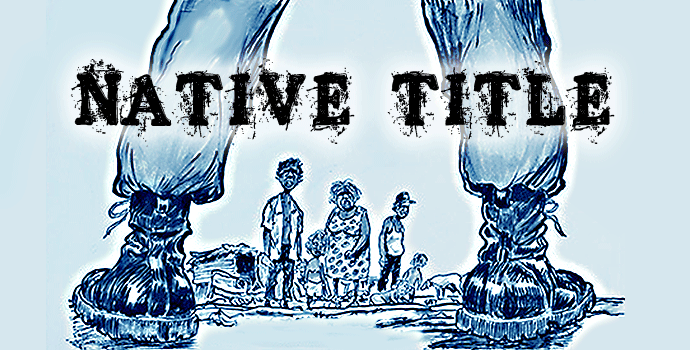

Ghillar, Michael Anderson 4 July 2018
Because of the enormous number of complaints I have received relating to Native Title, I am calling for a national summit and a Royal Commission into the operations of all Australian Native Title Service organisations, their lawyers and Prescribed Body Corporates (PBCs).
The destruction of Mallingbar Community
Kennedy Hill, Broome
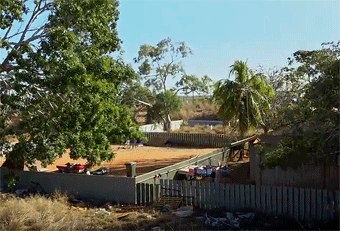
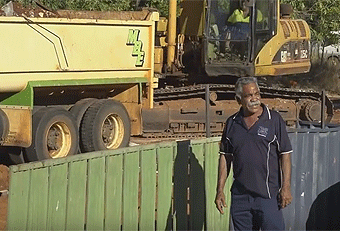
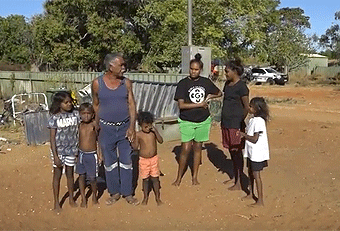
See videos below
In the last two years I have been inundated with complaints from First Nations Peoples throughout Australia about the operations of Native Title Services organisations, that are supposed to represent First Nations' interests, only to find the opposite is happening'
The bulldozing of homes on 1 July 2018 in the marginalisedMallingbar community on Yawaru country at Kennedy Hill, Broome, Western Australia, to make way for a tourist lookout, is one of the latest examples. This incident brings into sharp relief the roles of the local Yawuru Native Title Prescribed Body Corporate of which Senator Pat Dodson is a director; and Wayne Bergmann, CEO of KRED Enterprises; and the inaction of June Oscar, Aboriginal and Torres Strait Islander Social Justice Commissioner.
The demolition at Mallingbar, in the name of economic development, began the day after the end of the National Native Title Conference that was held at Cable Beach, Broome, Western Australia from 5 to 7 June 2018. Cable Beach is only five kilometres from Kennedy Hill, which is between two tourist resorts. Kennedy Hill is an ancient camp ground with large middens and is only half a block away from Broome's Old Chinatown. Mallingbar was also home to displaced people from the One Mile settlement, which was bulldozed to make way for the runway extension at Broome airport
The demolition was approved by the Prescribed Body Corporate that evolved from the Native Title determination, known as Yawuru Native Title Holders Aboriginal Corporation RNTBC ICN 7033, of which Senator Pat Dodson is a Director. It administers a charitable trust called Nyamba Buru Yawuru Ltd.
The Yawuru.com.au website states: “The Yawuru Agreement provides an opportunity for Yawuru to influence the future development of Broome, where Yawuru have opportunities in this development and can continue to safeguard Yawuru culture, way of life and strengthen our identity.”
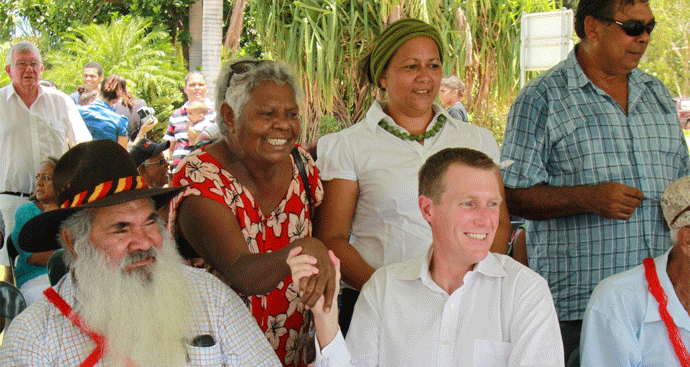
Signing ceremony for the 2010 Yawuru Agreements
Back row: L to R: Susan Edgar, Vicki McKenna, and Micklo Corpus. Front row: Patrick Dodson (now Senator) and then Western Australian Attorney-General, now Federal Attorney-General, Christian Porter
But as we see, the pressures of economic development override the well-being of the people, whether they are Sovereign Owners, or displaced First Nations people.
The Yawuru website also states: ‘The Economic Development section of this website is currently being reviewed.'(!!)
Walman Yawuru descendant and Goolarabooloo Elder, Ronnie Roe's reports of 29 June 2018 describe how homes on Kennedy Hill are bulldozed while families are still living in them, making them homeless with nowhere to go. See videos - right.
The complaints began when Native Title Services organisations and their appointed anthropologists and genealogists brought the wrong people into Native Title claims for Country and thus dominated and often outnumbered the real Sovereign Owners, thereby thwarting the real Sovereign Owners' rights to halt mining and development companies' interests on their lands.
The second complaint focuses on the establishment of Prescribed Body Corporates (PBCs) that the Native Title Act states are for common law holders, who consent to Native Title determinations. A PBC is the colonial legal entity that holds Native Title rights and interests in trust for common law holders.
In many cases, once a PBC becomes an “Indigenous/Aboriginal Corporation”, registered with the Office of the Register of Indigenous Corporations (ORIC), the constitution can be amended so that it allows membership for non-common law holders, who in many cases, then outnumber the real Sovereign Owners and as a consequence gain control of the PBC, facilitate mining agreements and development agreements against the wishes of the real Sovereign Owners.
Another shocking feature of PBCs is that their constitutions are framed in such a way that the membership of real Sovereign Owners' can be cancelled and/or refused by non-common law holders. For example, in The Rule-book of Yawuru Native Title Holders Aboriginal Corporation RNTBC ICN 7033 section 5.2.4(e) on membership it states:
What is even more astonishing and concerning, is the fact that these “historical” people and non-Sovereign Owners get to control and expend any or all trust funds and/or royalty monies and the real Sovereign Owners, in many cases, miss out on any advantages or financial rewards that should be theirs as quasi-compensation for the destruction of their Homelands.
In respect of any trust monies that come from Native Title determinations, these non-common law holders manipulate when and how Sovereign Owners' royalties are paid through purchase orders. In many cases the Prescribed Body Corporates or Native Title Services organisations engage non-Aboriginal administrators to administer the trust accounts on annual salaries that range between $150,000 to $350,000, plus additional expenses that may be occurred by them for their services, which include rented office space with phones and computers. The Sovereign Owners generally have no say as to who is appointed and they certainly don't have the power to dismiss them.
There is one such Trust Account where funds to the amount of $100,000 per year were allegedly paid to a husband and wife for conducting female and male cultural events, but the Sovereign Owners have never witnessed, in the past 10 years, any such cultural events taking place. In the case of the Kimberley, the Argyle diamond mine is winding down, yet Gelganyem Trust expenses doubled between 2015 and 2016 to $1.2 million for the administration of the Argyle royalty related to the mine, negotiated under the Native Title Act. See: Michael West and Suzanne Smith, “Indigenous communities grapple with end of the mining boom”, ABC Foreign Correspondent, 28 June 2017.
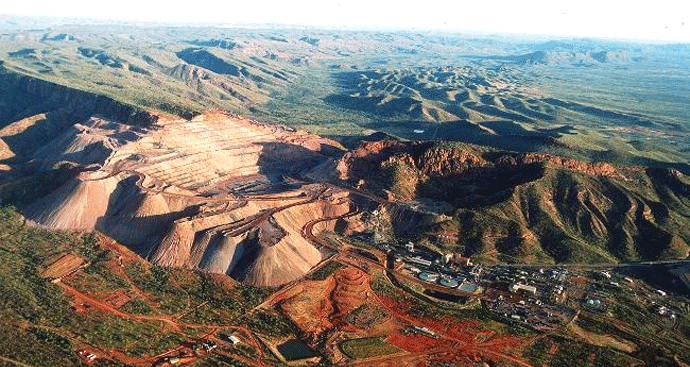
The Argyle diamond mine is winding down, yet Gelganyem Trust expenses doubled between 2015 and 2016 to $1.2 million for the administration of the Argyle royalty related to the mine, negotiated under the Native Title Act.
A third complaint is that Indigenous Land Use Agreements (ILUAs) have been placed before Sovereign Owners, who can barely read and write in English, and there is no translation in their mother tongue. Those to whom I have spoken in the last 12 months, say they have never been left a copy of the Indigenous Land Use Agreement or other documents they were coerced to sign. Indigenous Land Use Agreements have never been explained to the people in terms of what they mean, in particular, the consequences that flow from that agreement, in terms of their rights and interests; nor are they told what a “past act” is; nor how far back in time that “past” act reaches; and they certainly are not told what type of “past acts” they are authorising with their signatures.
Clearly, this is an absolutely illegal practice.
What makes this so horrific and beyond belief, is the fact that it is lawyers who are advising the Sovereign Owners to approve these terms in ILUAs. These Native Title lawyers certainly do not inform the people, that by signing the agreements, they forego ALL future rights to negotiate on development on their lands and, in the case of coastal people, they also give away rights to any operations on their coastline and out to sea, where their stories reach. This includes lands that are beyond the original claim, in respect to islands and reefs in particular.
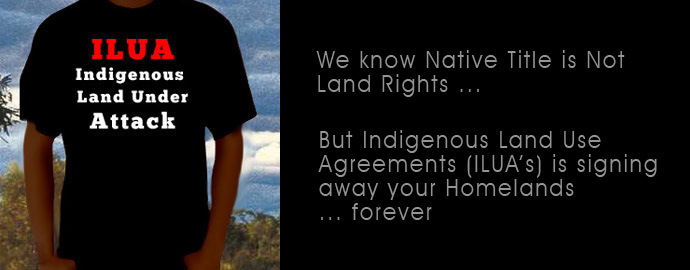
Indigenous Land Use Agreements (ILUAs) have been placed before Sovereign Owners, who can barely read and write in English, and there is no translation in their mother tongue.
What makes this situation even worse, is the fact that the lawyers do not explain to the people the effects of approving “future acts to be past acts”. In effect, Native Title common law holders sign away any future rights to negotiate about development on their lands. Who would knowingly do this?
There is another insidious and evil practice being perpetrated against Sovereign Owners involved in Native Title claims by these Native Title service lawyers and that is, they do not explain that there are certain sections within the Native Title Act which absolutely racially discriminate against them as First Nations Peoples, in respect of their ordinary civil rights under the colonial common law.
Native Title lawyers certainly do not go anywhere near explaining that there are other sections within the Native Title Act that racially discriminate against First Peoples' customary Laws and cultural practices, for example, native vegetation laws in every State and Territory, as they relate to the Peoples' totemic relationships under their Law and cultures.
Native Title Services lawyers discourage First Nations Peoples from claiming mineral rights, especially their rights to the Royal metals–gold and silver. I am yet to find the section within the Native Title Act that says that First Nations Peoples are NOT permitted to claim rights to the natural resources that are on or beneath their lands. What should be of interest to all concerned, in this regard, is the advice to former PM John Howard from lawyers of the Samuel Griffith Society, which I have referred to in the past and I quote:
NSW relies on the Royal prerogative to underpin its ownership of the Royal Minerals (gold and silver). A case is likely to be constructed by Aboriginal people, on the basis of sovereignty, to test the Crown ownership of minerals. If a case for sovereignty is successful, then there may be latitude for a claim for compensation in respect of at least the royal minerals, or a royalty payable to indigenous groups for royal minerals extracted, both past and future. If Crown ownership of minerals is affirmed in the amendments then there may well be a case for compensation mounted by indigenous groups.
The States are wary of this possibility and have subsequently encouraged the federal Government to avoid any affirmation of Crown ownership.- Native Title: A Path to Sovereignty, Dr Stephen Davis, p. 1
On this point alone, First Nations Peoples should be encouraged to claim compensation for all those past acts. Moreover, Native Title Services lawyers should be (and I emphasise should be) advising Native Title applicants that they do have a right to claim compensation for mineral, petroleum and gas extraction on all lands, not just Crown lands, because of what the High Court determined in Mabo and again I repeat:
33. International law recognized conquest, cession, and occupation of territory that was terra nullius as three of the effective ways of acquiring sovereignty. No other way is presently relevant …
But if the land were occupied by the indigenous inhabitants and their rights and interests in the land are recognized by the common law, the radical title which is acquired with the acquisition of sovereignty cannot itself be taken to confer an absolute beneficial title to the occupied land …
9 … It is not surprising that the fiction that land granted by the Crown had been beneficially owned by the Crown was translated to the colonies and that Crown grants should be seen as the foundation of the doctrine of tenure which is an essential principle of our land law. It is far too late in the day to contemplate an allodial or other system of land ownership. Land in Australia which has been granted by the Crown is hold on a tenure of some kind and the titles acquired under the accepted land law cannot be disturbed.
I know that some lawyers argue that the parliaments can make laws to overturn decisions of a court but what these lawyers fail to accept is the fact that, if such changes impact and change the rights of the First Nations Peoples which are affected by those changes, then just terms compensation is in order. The fact that Mabo made this ruling, commits ALL legislatures in this Country to negotiate just terms settlements.
Now I turn to Howard's Ten Point 1998 Native Title Act amendment that was regularly condemned by the UN CERD in its Concluding Observations of the Committee on the Elimination of Racial Discrimination–AUSTRALIA:
On 18 March 1999:
3. The Committee recognizes that, within the broad range of discriminatory practices that have long been directed against Australia's Aboriginal and Torres Strait Islander peoples, the effects of Australia's racially discriminatory land practices have endured as an acute impairment of the rights of Australia's indigenous communities.
6. … While the original 1993 Native Title Act was delicately balanced between the rights of indigenous and non-indigenous title holders, the amended Act appears to create legal certainty for Governments and third parties at the expense of indigenous title.
On 14 April 2005:
16. The Committee notes with concern the persistence of diverging perceptions between governmental authorities and indigenous peoples and others on the compatibility of the 1998 amendments to the Native Title Act with the Convention. The Committee reiterates its view that the Mabo case and the 1993 Native Title Act constituted a significant development in the recognition of indigenous peoples' rights, but that the 1998 amendments roll back some of the protections previously offered to indigenous peoples and provide legal certainty for Government and third parties at the expense of indigenous title. The Committee stresses in this regard that the use by the State party of a margin of appreciation in order to strike a balance between existing interests is limited by its obligations under the Convention (art. 5).
The Committee recommends that the State party refrain from adopting measures that withdraw existing guarantees of indigenous rights and that it make every effort to seek the informed consent of indigenous peoples before adopting decisions relating to their rights to land. It further recommends that the State party reopen discussions with indigenous peoples with a view to discussing possible amendments to the Native Title Act and finding solutions acceptable to all.
17. The Committee is concerned about information according to which proof of continuous observance and acknowledgement of the laws and customs of indigenous peoples since the British acquisition of sovereignty over Australia is required to establish elements in the statutory definition of native title under the Native Title Act. The high standard of proof required is reported to have the consequence that many indigenous peoples are unable to obtain recognition of their relationship with their traditional lands (art. 5).
The Committee wishes to receive more information on this issue, including on the number of claims that have been rejected because of the requirement of this high standard of proof. It recommends that the State party review the requirement of such a high standard of proof, bearing in mind the nature of the relationship of indigenous peoples to their land. CERD/C/AUS/CO/14 14 April 2005
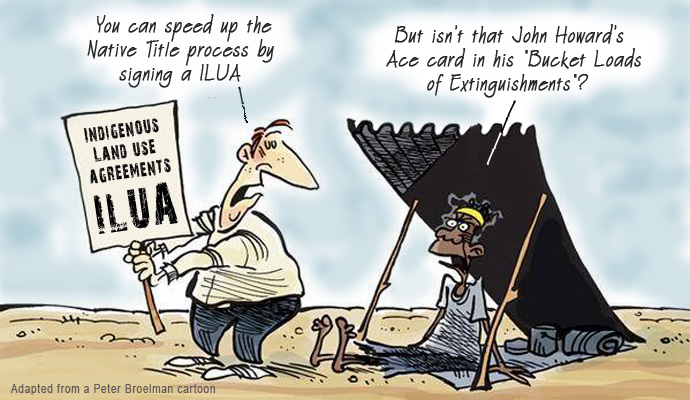
That Mabo and Wik decisions were attacked mercilessly by the Howard government. Tim Fischer, Deputy Prime Minister boasted that there would be bucket loads of extinguishment, regarding the Howard government's response to the decisions.
On 8 December 2017:
22. The Committee recommends that the State party moves urgently to effectively protect the land rights of Indigenous Peoples including by amending the Native Title Act 1993 with the view to lowering the standard of proof and simplifying the applicable procedures. It also urges the State party to ensure that the principle of free, prior and informed consent is incorporated in the Native Title Act 1993 and in other legislation as appropriate, and fully implemented in practice. Moreover, the Committee recommends that the State party respect and apply the principles enshrined in the United Nations Declaration on the Rights of Indigenous Peoples, and consider adopting a national plan of action to implement these principles. The State party is also encouraged to reconsider its position and ratify the ILO Indigenous and Tribal Peoples Convention, 1989 (No. 169). CERD/C/AUS/CO/18-20?
Considering what was held to be racially discriminatory by the CERD, First Nations Peoples throughout this country should be coming together to sue the Commonwealth government for compensation for breaching international jus cogens and international legal norms, which the Australian government is legally bound to observe.
There is also another very important legal question that our people should be looking at and that is: How did the Australian government under Keating construe their Constitutional rights to even pass the Native Title Act in the first instance? Considering land tenure is the sole responsibility of the States, there is no section in the Australian Constitution that gives the executive government of the Commonwealth the head of power to pass any type of laws dealing with land tenure in the States. To acquire this head of power under the Australian Constitution, the State parliaments would have had to have had ceded those land tenure rights to the Commonwealth.
In this case I am reminded of the correspondence between the Australian Capital Territory government and John Howard, in which the Australian Capital Territory informed Howard that they could not agree to his Ten Point Plan if it meant that the States and Territories had to pay just terms compensation to First Nations Peoples for their rights that were taken away. It was these questions from the States and Territories that forced Howard to suspend the Racial Discrimination Act. In this correspondence there are also records of handing to the Commonwealth government responsibility to pass laws for land tenure within the States and Territories.
We do know that the Commonwealth government can pass laws in respect to land within the Commonwealth and their territories, e.g. Native Title and for the Australian Capital Territory. The Commonwealth's interference with land tenure in the Territories is now questionable.
This question becomes a reality when we understand that the Commonwealth Attorney-General applied for a demurrer in the High Court challenge by the community council of Maningrida, when they sued for compensation because the Northern Territory Emergency Response law (the Intervention) look away their rights to have ownership and control over their lands in that community. Wurridjal v The Commonwealth of Australia [2009] HCA 2 (2 February 2009) and see http://nationalunitygovernment.org/content/dangers-single-treaty
A “demurrer” is equivalent to a gag-order. A “demurrer” is also a pleading in a lawsuit that objects to, or challenges, a pleading filed by an opposing party. The word “demur” means “to object”; a demurrer is the document that makes the objection. ... The demurrer challenges the legal sufficiency of a cause of action in a complaint or of an affirmative defence in an answer.
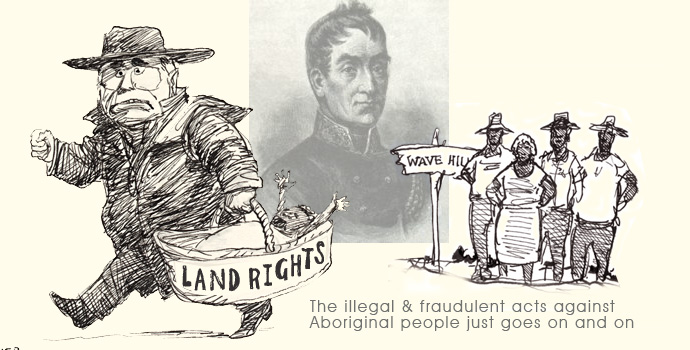
(illustration adapted from cartoon by John Spooner, 2000)
A further complaint that needs to be investigated urgently is represented by two factors:
There are Native Title Services organisations around this country that are encouraging First Nations Peoples to make Native Title claims over lands that are exclusively reserved for “the use of Aborigines only” under State laws, as was the case with the New South Wales Aboriginal Land Trusts. In these cases, State laws also recognise that the First Nations Peoples in these instances own all the minerals on, and below, that ground. When Native Title claims are placed over these lands and Native Title is agreed to by the States, the rights to the ownership of minerals above and below the ground, including petroleum and gas, reverts back to Crown ownership and are thus controlled by the State governments. Native Title Services organisations are encouraged by transnational corporations, and locally-owned Australian mining companies have contributed financially to encourage Native Title Services, to do just that. The companies do not want to have to negotiate with First Nations owners of minerals, gas and petroleum on and within their lands and waters.
The list goes on. First Nations Peoples are beginning to realise how extensive is the damage that is being done to their rights as the true Sovereign Owners of this land and waters.
A full legal enquiry, such as a Royal Commission, may well establish that such actions by Native Title Services could constitute fraudulent misappropriation of funds specifically identified for Native Title claims. Too many of our Peoples are being deprived of their rights under the Native Title process.
Too many of our Peoples are validating all land laws in the States dating back to the original grants of lands that were illegally appropriated and/or where the Crown benefited and profited from the proceeds of crimes that amount to absolute genocide right across this country.
There is no time limit on murder and as a consequence our people have an absolute inherent right to be justly compensated for the wrongful acts that have been committed against us.
In this regard, I am proposing a National Summit be convened to discuss these and other matters for presentation to the national parliament and I recommend that those wishing to participate in this summit bring with you all the stories of the wrongdoings by Native Title instrumentalities, because I believe that our Peoples not only have evidence for an action against the Commonwealth government, but also the Native Title Services organisations themselves.
Our Peoples are beginning to understand that there is something very wrong, especially when Native Title lawyers tell community members that the only way to acquire sovereignty is to acquire an army, navy and air force and declare war!! Read more about this in our media release at: http://nationalunitygovernment.org/content/kimberley-land-council-klc-ag...
Worse still, there is a resident Catholic nun advising an Aboriginal community that you HAVE TO have Native Title before you can get sovereignty!! Where does this stop?, Anderson said.
Our people must understand that Native Title Services organisations around this country, be they Land Councils or Native Title Services, are fully funded by the Commonwealth government to facilitate the “legal” theft of our lands, and the mechanisms in the Native Title Act enable the absolute “legal” theft, through Indigenous Land Use Agreements (ILUAs). In ILUAs you not only authorise past acts, but also “future acts as past acts”, but there is also a word in the Native Title Act, which is used in ILUAs and that is, that you agree to surrender all future claims to your country, waters and natural resources. I am yet to hear of a Native Title Services lawyer explaining to First Peoples what these three elements truly mean to the people now, for their children into the future and the impacts that they have. Additionally, ILUAs generally require those signing to agree to surrender their land, called the ‘surrender area', to the local Shire.
In the last written words of Kevin Gilbert (1933-1993)
we must be true to the Dream
but all this is only meaningful
if there are Dreamers who respond
to make the Dream come true.
In short, it means that those who sign have authorised everything for the British occupying power to have absolute ownership. In my opinion, as a stalwart for Land Rights and Sovereignty, if we do not take a stand now, then we will lose everything and all our efforts now and over the past 230 years will have been for nothing.
The legacy that we will leave behind is First Nations Peoples, who no longer own their language, who no longer own their culture, who no longer own their water, who no longer teach their own children, who are no longer at Home on their own Country. If this were to happen, we will be like leaves on a dying tree. What Nation will be the last leaf to fall?
Or do we keep the dreams alive?
We will organise a National Summit to address these issues and challenge the operations of Native Title lawyers and Native Title Service organisations. So, attend the National Summit to keep the dream alive – time and date to be advised.
Contact Ghillar
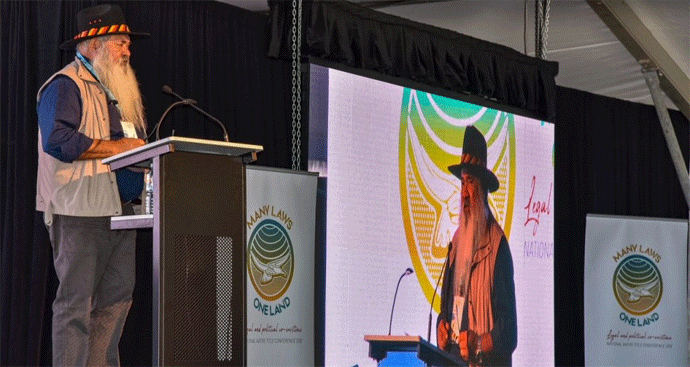
The demolition at Mallingbar, in the name of economic development, began the day after the end of the National Native Title Conference that was held at Cable Beach, Broome
Image: Patrick Dodson at the Native Title Conference, Broome, 2018 (IndigeousX)

